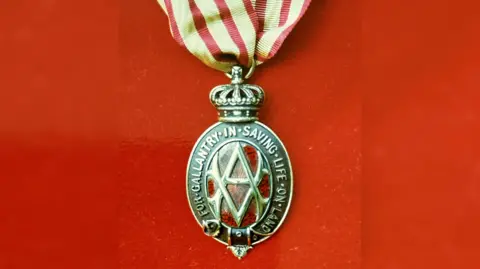Medic's rare WW2 medal 'should be in museum'
The family of a man who was posthumously honoured for saving lives during World War Two are looking for a new home for his rare bravery medal.
Arturo Fanconi, better known as Arthur, was killed in France on 28 June 1944 while volunteering as a medical assistant in the Royal Navy.
The 38-year-old, who was born in Kent before his family moved to Ilminster, in Somerset, was posthumously awarded the Albert Medal (AM) in gold - the civilian equivalent of the Victoria Cross.
Speaking to BBC Radio Somerset, his great-niece said it would be “wonderful” for the medal to be displayed publicly in a museum.
'Selfless courage'
Mr Fanconi was a second-generation Swiss immigrant who grew up working in his father’s bakery and volunteering with the Red Cross.
After the outbreak of war, his nationality and occupation meant he was exempt from conscription.
But wanting to “do his bit” for the war effort, in 1943 he secretly volunteered for the medical branch of the Royal Navy, his great-niece Gill Haggarty said.
It resulted in him being deployed to Normandy as a sick bay attendant following the D-Day landings on 6 June 1944.
His AM citation describes how on 28 June 1944 he was summoned to help American servicemen wounded by mines at Quinéville.
 Gill Haggarty
Gill HaggartyHe crossed a minefield to save two men but was injured in a blast while trying to reach a third.
Despite being in great pain, he gathered up his scattered medical kit and continued to crawl towards the patient.
Two more mines were set off in the process and Mr Fanconi was fatally wounded.
The citation concludes: “All who had witnessed his selfless courage, his speed and skill in giving aid to others, all the while exposing himself to immediate danger, were inspired by his great example.”
Ms Haggarty said they are "so proud" of Mr Fanconi, who is buried at the Bayeux War Cemetery.
“We just want to get that story out there because not only was he so brave in doing this, he actually shouldn’t have ever been anywhere near a war zone at all,” she added.
'Very rare'
The Albert Medal was the precursor to the George Cross and was awarded sparingly between 1866 and 1971 for civilian acts of gallantry in saving life at sea and on land.
It was issued in the name of the monarch in two classes – the first in gold and the second in bronze.
Mr Fanconi’s gold medal was featured on a recent episode of BBC One TV programme Antiques Roadshow, filmed at Pitzhanger Manor and Gallery in west London.
Military expert Robert Tilney told the family it was “a very, very rare medal” with a value of between £20,000 and £25,000.
“[The value] goes a little tiny way to thanking somebody for that selfless heroism”, he added.
 Gill Haggarty
Gill HaggartySpeaking after the broadcast, Ms Haggarty told BBC Radio Somerset: “We’d always been told it was a special medal but we actually had no idea just how unusual it was.”
She said the medal is currently stored in a safe deposit box but it would be “wonderful” for it to be on public display in a museum.
She added it could be displayed alongside other related items, including the invitation to Buckingham Palace that the family received on Mr Fanconi’s behalf.
“We would very much like it to be somewhere so that other people that are interested can see it and know his story,” she said.
Follow BBC Somerset on Facebook and X. Send your story ideas to us on email or via WhatsApp on 0800 313 4630.
